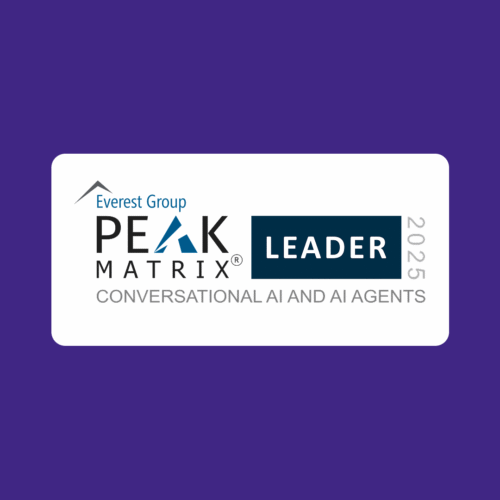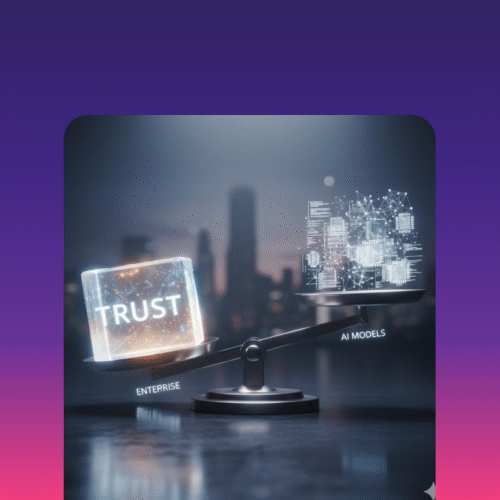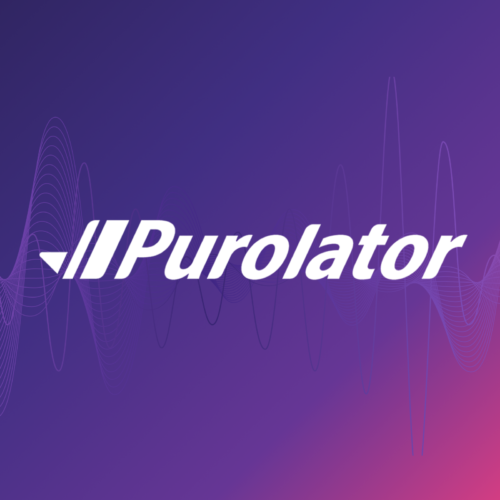In contact centers, complexity is a given. Banks and telcos require security woven into every dialog and routing that scales efficiently to millions of calls. Retailers demand assistants that understand human nuance, switching channels effortlessly and escalating seamlessly to agents.
The real challenge was never complexity itself, it was how to manage it systematically without sacrificing speed, reliability, or security.
MiniApps: Engineering AI Into an Alphabet
At Omilia, we addressed this challenge long before the emergence of GenAI technologies. We built miniApps®: modular, production-grade components encapsulating NLU, ASR, dialog management, and GenAI capabilities. Think of them as an alphabet. They gave us a structured, reliable language to assemble applications rapidly and predictably, ensuring every customer experience was robust, scalable, and deeply contextual.
This mindset – that reusable, composable units accelerate innovation – shaped our engineering philosophy. MiniApps allowed us to build solutions that didn’t just work technically but delivered business impact from day one, to ship faster, and to maintain quality at scale.
What is MCP?
In November 2024, Anthropic introduced Model Context Protocol (MCP), a structured protocol redefining how AI models interact with external systems (read the MCP introduction here).
- A standard protocol enabling language models to call remote functions and APIs dynamically.
- Lets AI technology pass structured parameters to functions and integrate outputs seamlessly into its reasoning flow.
- Functions are defined once in a way models natively understand, enabling context-aware function calling without bespoke orchestration logic.
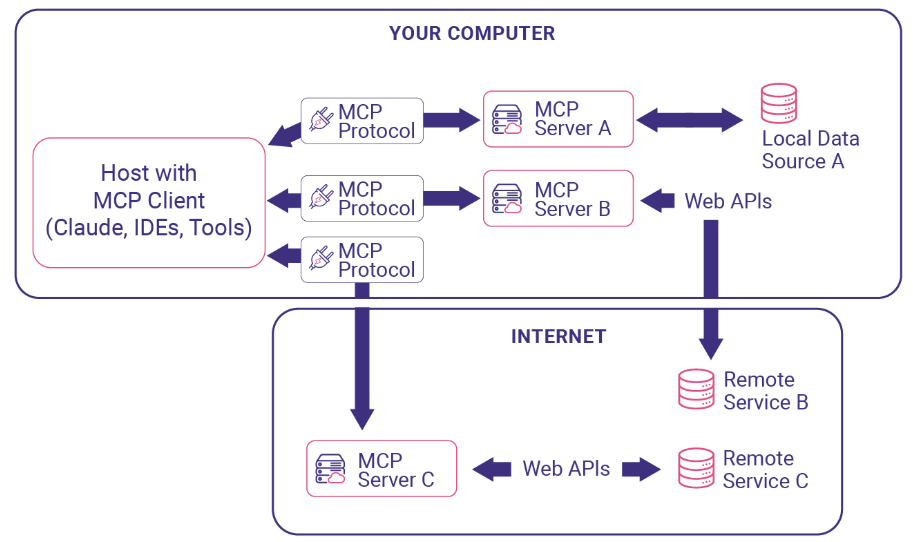
Why does MCP matter?
- Removes the need for manual integration pipelines for every new API or function since we can build agents and complex workflows on top of LLMs.
- Frees developers from fragile glue code, allowing AI to know when, how, and why to call backend systems mid-conversation.
- Speeds up delivery of capabilities, reducing engineering bottlenecks and integration risks, leveraging a growing ecosystem.
- Enables building networks of MCP clients and servers, separating concerns across microservices and scaling smoothly without compromising performance or maintainability.
For more details, see the latest MCP architecture specification.
What Are the Core Components of the MCP Ecosystem?
MCP’s architecture consists of several key components that work together to deliver this new paradigm of intelligent, action-oriented AI:
1. MCP Clients: The AI Consumers
AI applications or language models that leverage MCP to extend capabilities beyond static processing. They define function calls or tool definitions in structured formats, enabling them to call APIs, retrieve data, or execute workflows dynamically within conversations.
2. MCP Servers: The Capability Providers
MCP servers expose the underlying functions, APIs, or miniApps as callable endpoints for MCP clients. At Omilia, MCP servers wrap our proven miniApps – NLU, ASR, dialog management, speech analytics – and external APIs as MCP-compliant functions, making them accessible in a structured and standardized way.
3. Function Definitions: The Contracts
Structured schemas describing what each function does, its inputs and outputs, and how it integrates into the AI’s reasoning process. Function definitions act as the contract between client and server, ensuring clarity, consistency, and safety in dynamic function calling.
4. Networked MCP Topologies: The Scalable Architecture
MCP supports networks of clients and servers, enabling separation of concerns and modular scaling. For example, one MCP server can handle dialog management, another analytics, and a third business process automation, all orchestrated dynamically by AI clients for optimal performance, maintainability, and security.
Together, these components form an ecosystem where AI applications become intelligent orchestrators, dynamically invoking capabilities, adapting to context, and delivering proactive, decisive outcomes within enterprise workflows.
How Does MCP Empower Omilia’s Technology Consumers?
Omilia’s MCP servers expose our miniApps and various functions and APIs as structured MCP servers accessible by partners, developers, and integrators.
This unlocks direct, reliable access to our proven AI capabilities for building complex applications effortlessly.
Developers can now dynamically orchestrate APIs and building blocks, creating intelligent, proactive solutions tailored to real-world customer needs.
It empowers teams to build applications that don’t just respond, but act, integrating structured workflows with conversational understanding seamlessly.
The miniApps foundation meant that when MCP emerged, we didn’t need to rethink our architecture; we were already prepared to integrate and amplify it seamlessly.
Why This Changes Everything
AI is shifting from passive Q&A systems to active orchestrators of workflows and decisions. Where it once simply answered questions, it now connects seamlessly to backend systems, executes actions, and manages complex interactions with human-like intuition.
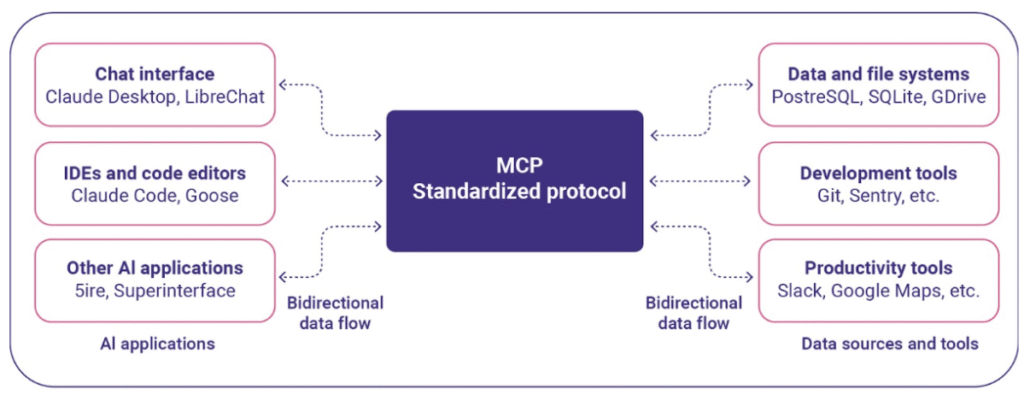
Developers
For developers, MCP unlocks a new paradigm: building applications that don’t just process inputs but take real actions in real time, integrating dynamic function calls with natural language understanding without added complexity. This reduces integration friction, accelerates delivery, and empowers teams to build solutions that adapt and scale without architectural bottlenecks.
CX Leaders
For CX leaders, it translates to faster rollouts, lower integration costs, and customer journeys that feel intuitive and seamless because they are driven by systems designed to understand intent deeply and act decisively. It enables experiences where customers feel heard and served in a single flow, without the typical silos and handoffs that erode satisfaction.
Enterprises
For enterprises, this marks a pivotal step towards AI systems that don’t just talk, they understand context, adapt intelligently, execute actions confidently, and deliver measurable business outcomes with precision. It redefines what AI means in operations: from an assistant at the edge to a trusted, integrated partner driving transformation at the core of every interaction.
A Final Reflection
Technologies like MCP don’t replace what Omilia has built; they amplify it. The silent revolution lies in having the right foundations, composable building blocks, modular architectures, disciplined engineering practices, so that when breakthroughs emerge, they accelerate our strategy rather than disrupt it.
At Omilia, our belief has always been simple: AI is not an add-on. It is a multiplier. And with MCP amplifying our ecosystem and application building blocks such as miniApps, we are engineering the future of contact centers not as a dream, but as a practical, scalable, and intelligent reality.
About the Author
Marios Fakiolas, Chief Technology Officer
With a career spanning more than 20 years across defense, software engineering, enterprise software, and AI startups, Marios brings a unique combination of deep technical expertise and executive leadership. He first joined Omilia in 2017 holding senior technical roles and was instrumental in shaping the company’s early voice-first AI capabilities. In 2021, Marios founded HelloWorld PC, a boutique tech firm focused on AI and modern engineering practices. As CEO, he scaled HelloWorld into a trusted innovation partner delivering next-generation AI solutions across sectors. Now, he returns to Omilia as CTO with a bold vision for the future.
